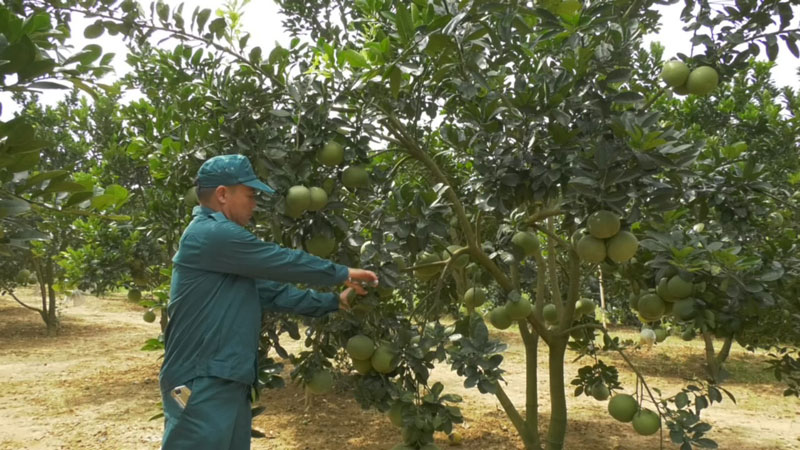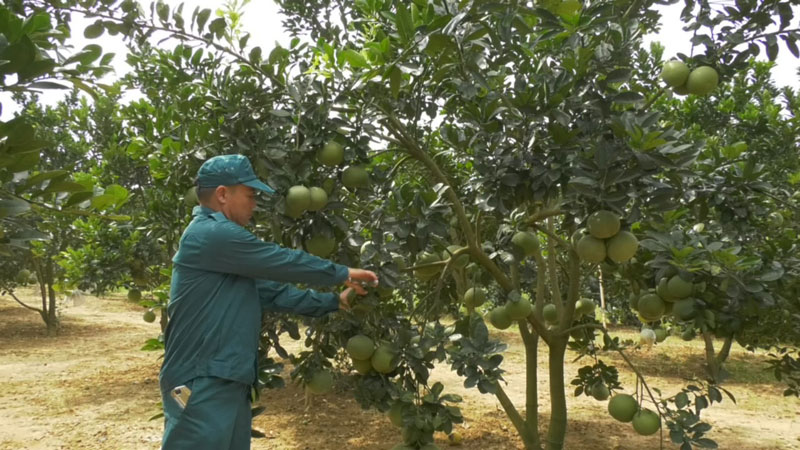
(HBO) Born and raised on the land of 2/9 Hoa Binh Farm, which is now 2/9 Hoa Binh One Member Limited Company, after many years working in the South and the North, in 2006, Mr. Ta Huu Hau returned to work as a farmer, participating in the company’s militia and self-defense force.

In 2008, he invested 20 million VND to buy 1
ha of garden land. During this time, Mr. Hau still went back and forth to the
South and North to work. After many nights of thinking, exploring, learning
from friends, books, newspapers and television, Mr. Hau decided to buy 200 Doan
Hung pomelo trees, Green pomelo trees and Tan Lac Red pomelo trees. He planted
pomelo trees in his garden as an experiment.
After 3 years of sun-drenched beams with new
kinds of pomelo trees, in the first year his family earned over 200 million VND
from pomelo trees. He gradually bought more land to expand the production. Up
to now, the scale of Mr. Ta Huu Hau's garden has expanded to 3 hectares. He has
focused on investing, renovating and planting more than 1,200 citrus trees with
high economic value. The products are also popular in the market. They are Doan
Hung pomelo trees, the Green skin pomelo trees, Tan Lac Red pomelo trees, Dien
pomelo trees, Canh Oranges and peach-lemon trees. Along with that is the system
of indigenous pig breeding facilities including 30 female pigs and piggies.
Talking about the effectiveness of pomelo trees, Mr. Hau said that 200 pomelo
trees at the beginning brought have about 4 million VND per tree per year and
the newly-planted ones have also brought a benefit of 1 million VND / tree. So
I have found that planting pomelo trees is much more effective and valuable
than growing rice and corn.
Together with this, Mr. Hau has opened a
grocery store at home to sell the essential goods to serve the consumption
needs of the local people. At the same time, he is co-ordinated with Phu My
Fertilizer Company to demonstrate the set of NPK and potassium protein
products. From the income of over 200 million VND, now his family's annual income
is about 2 billion VND. In two years, 2017 and 2018, Mr. Ta Huu Hau was awarded
a certificate for the outstanding and typical farmers by the Chairman of the
Provincial People's Committee. He was also awarded a certificate of outstanding
production and business farmers by the Provincial Farmers’ Association.
According to data from the Hoa Binh Provincial Party Committee, the industrial production index for the first six months of 2025 is estimated to have increased by 20% compared to the same period last year. This marks the highest year-on-year growth rate for this period since 2020.
In the first six months of 2025, Hoa Binh province’s export turnover was estimated at 1.145 billion USD, marking an 18.11% increase compared to the same period in 2024. Import turnover was estimated at $ 804 million, a 17.15% increase, which helped the province maintain a positive trade balance.
The lives of the ethnic minority farmers in Tan Lac district have gradually improved thanks to the new directions in agricultural production. This is a testament to the collective strength fostered through the professional associations and groups implemented by various levels of the district’s Farmers’ Union.
With the motto the "product quality comes first,” after nearly one year of establishment and operation, Muong village’s Clean Food Agricultural and Commercial Cooperative, located in Cau Hamlet, Hung Son Commune (Kim Boi district), has launched reputable, high-quality agricultural products to the market that are well-received by consumers. The products such as Muong village’s pork sausage, salt-cured chicken, and salt-cured pork hocks have gradually carved out a place in the market and they are on the path to obtaining the OCOP certification.
In the past, the phrase "bumper harvest, rock-bottom prices" was a familiar refrain for Vietnamese farmers engaged in fragmented, small-scale agriculture. But today, a new spirit is emerging across rural areas of Hoa Binh province - one of collaboration, organisation, and collective economic models that provide a stable foundation for production.
Maintaining growing area codes and packing facility codes in accordance with regulations is a mandatory requirement for agricultural products to be eligible for export. Recently, the Department of Agriculture and Environment of Hoa Binh province has intensified technical supervision of designated farming areas and packing facilities to safeguard the "green passport" that enables its products to access international markets.



